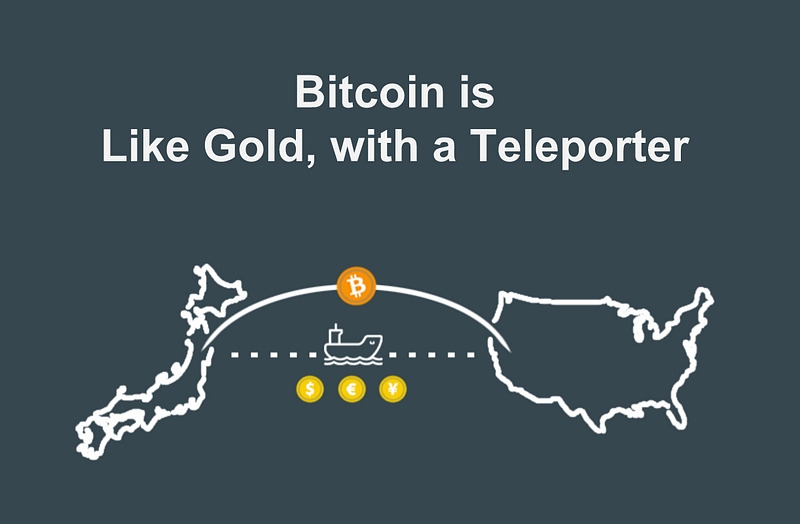Bitcoin is the world’s first open source, decentralized digital currency, payment network and ledger.
Bitcoin is an internet based, peer to peer, electronic cash protocol — similar to SMTP, VOIP or HTTP — that enables low cost, fast, programmable and censorship resistant value transfer between any individual — or thing. Important to note that bitcoin can do all of these great things without the need of a trusted third party. No government or company or person owns bitcoin. Bitcoin belongs to everyone and redefines ‘permission-less innovation’.
First, there was the printing press. Then, there was the internet. Now, we have bitcoin.
Here’s Google‘s definition of bitcoin
A type of digital currency in which encryption techniques are used to regulate the generation of units of currency and verify the transfer of funds, operating independently of a central bank.
Enter email.
Go back 15 or 20 years, before email was widely used. Do you remember what it was like to send a letter to your grandmother on the other side of the world? You’d sit down, take out a pen and paper, write out a nice long letter, seal it up, walk over to the post office (9–4) and finally after waiting in line for 15 minutes, you’d get to send off your letter to your sweet grandma. Not to mention, it would cost a lot of money and time to do all of this, it would literally take your grandmother weeks to receive that letter. By the time she received it, the news was old and irrelevant. What a great system.
What email does for information transfer, bitcoin does for value transfer
Sending money today
Think about how money travels around the world today. Let’s say your grandma from half way across the world needs you to send her $100 so that she can get groceries for the month. You will need to go to your bank atm, take out $100. Wait until Western Union is open. Drive to Western Union. You’d end up paying nearly $20 in fees and if you’re lucky, she’d receive the money in a few days. Does that remind you of something?
Enter bitcoin.
With bitcoin, you literally just click a button and send as little or as much value to another person for just a few pennies. Whenever I introduce new people to bitcoin, I always share the following video. Check it out.
Gold with a teleporter
Bitcoin is like gold with a teleporter. Due to the inherent nature of bitcoin — fungible, divisible, predictable supply, impossible to forge, portable, global, etc. — many people equate bitcoin to be like an internet based digital gold. Since bitcoin is inherently interoperable, you can easily send bitcoin to anyone, much like how you send an email.

Bitcoin: The New Gold Standard
PayPal recently appointed Wences Casares to its Board of Directors. Here is one of the best explanations of bitcoin I’ve ever heard. I really enjoyed learning about the history of money along with the many myths surrounding the topic of money.
Bitcoin is like copper
Yet another beautiful analogy I recently came across is that bitcoin is more like copper. Listen to this interesting description by Glenn Hutchins on the similarities between bitcoin and copper.
Bitcoin is a concept
Bitcoin means many things to many people. It’s kind of like the Internet in the early days. Imagine if 15 years ago I was telling you about the iPhone: “dude, it’s this amazing thing that will replace your phone, camera, TV, notebook, calculator, encyclopedia, rolodex, map, newspaper, calendar, personal assistant, travel agent, photo album, instant global messenger, torch light, personal driver, and a million other things”, would you believe me? Probably not. Check out Barry Silbert’s description of bitcoin.
What does Satoshi have to say?
If you really wanna know, ask Satoshi, the creator of bitcoin. Satoshi’s white-paper is the most accurate answer to the question, “what is bitcoin?”. Here’s what the white paper says:
“A purely peer-to-peer version of electronic cash would allow online payments to be sent directly from one party to another without going through a financial institution. Digital signatures provide part of the solution, but the main benefits are lost if a trusted third party is still required to prevent double-spending. We propose a solution to the double-spending problem using a peer-to-peer network. The network timestamps transactions by hashing them into an ongoing chain of hash-based proof-of-work, forming a record that cannot be changed without redoing the proof-of-work. The longest chain not only serves as proof of the sequence of events witnessed, but proof that it came from the largest pool of CPU power. As long as a majority of CPU power is controlled by nodes that are not cooperating to attack the network, they’ll generate the longest chain and outpace attackers. The network itself requires minimal structure. Messages are broadcast on a best effort basis, and nodes can leave and rejoin the network at will, accepting the longest proof-of-work chain as proof of what happened while they were gone.”
Source: https://medium.com/@SunnyRay/what-is-bitcoin-3ed42d945441#.lovr5h4ts







